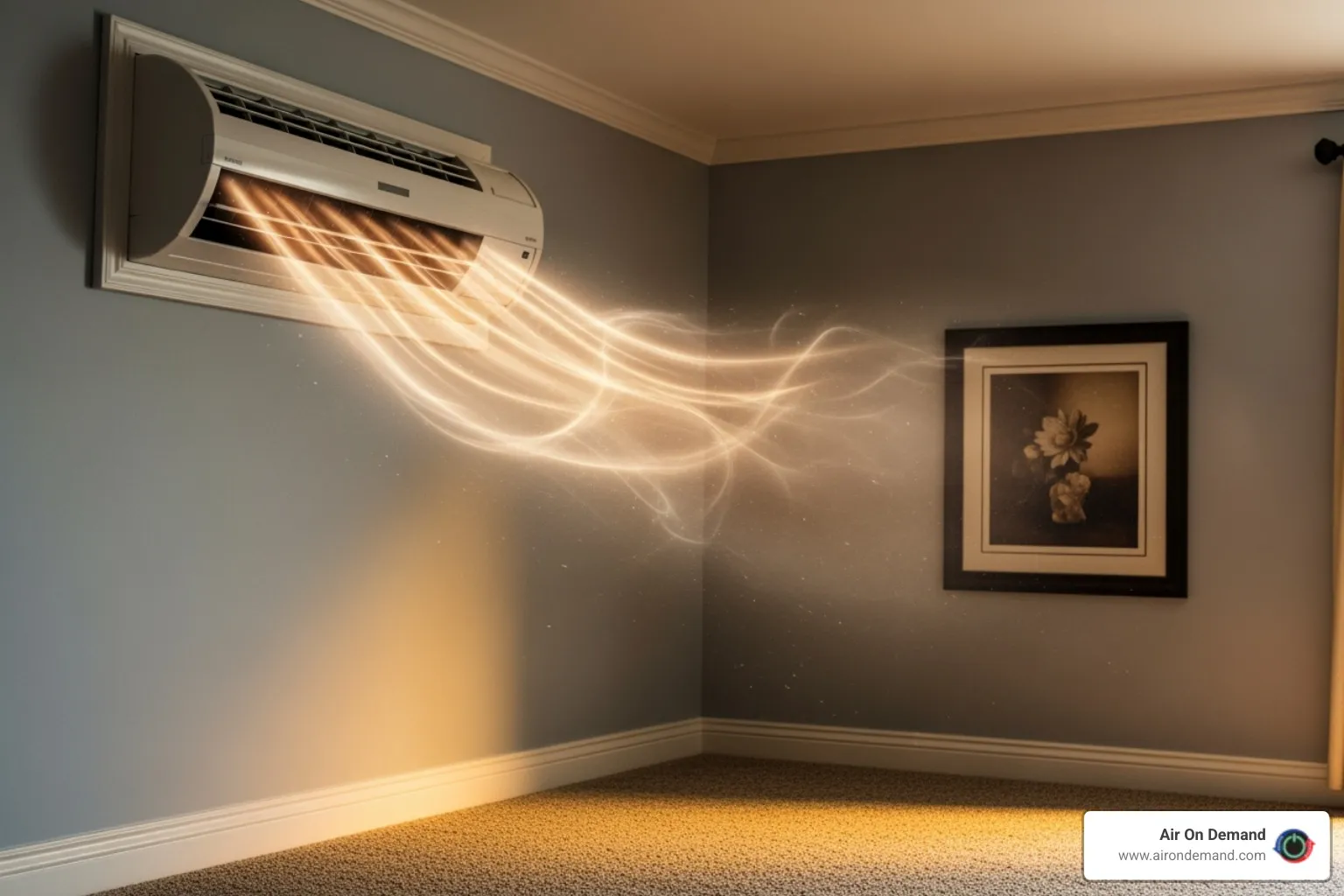Why Your Home AC System Suddenly Turned Into a Heater
When your ac blowing hot air instead of the cool relief you expect, it's more than just frustrating - it's a clear signal that something has gone wrong with your cooling system.
Quick Answer: Top 5 Reasons Your AC Blows Hot Air
- Thermostat Issues - Set to heat mode or fan-only instead of cool
- Dirty Air Filter - Blocked airflow causes system strain
- Low Refrigerant - Leak prevents proper heat absorption
- Frozen Evaporator Coils - Ice buildup stops cooling process
- Power Problems - Outdoor unit lost electricity while indoor fan runs
Your air conditioning system has one main job: move heat from inside your home to the outside. It does this through a simple but precise process called the refrigeration cycle.
Here's how it normally works: Cold refrigerant flows through indoor coils (called the evaporator), absorbing heat from your home's air. A fan blows this newly cooled air through your ducts. Meanwhile, the hot refrigerant travels to outdoor coils (the condenser) where it releases that heat outside.
When any part of this cycle breaks down, your AC can't remove heat properly. Instead of cool air, you get warm or even hot air flowing from your vents.
The good news? Many causes have simple fixes you can try yourself. Others need professional help, but knowing the difference can save you time, money, and a lot of sweaty discomfort.
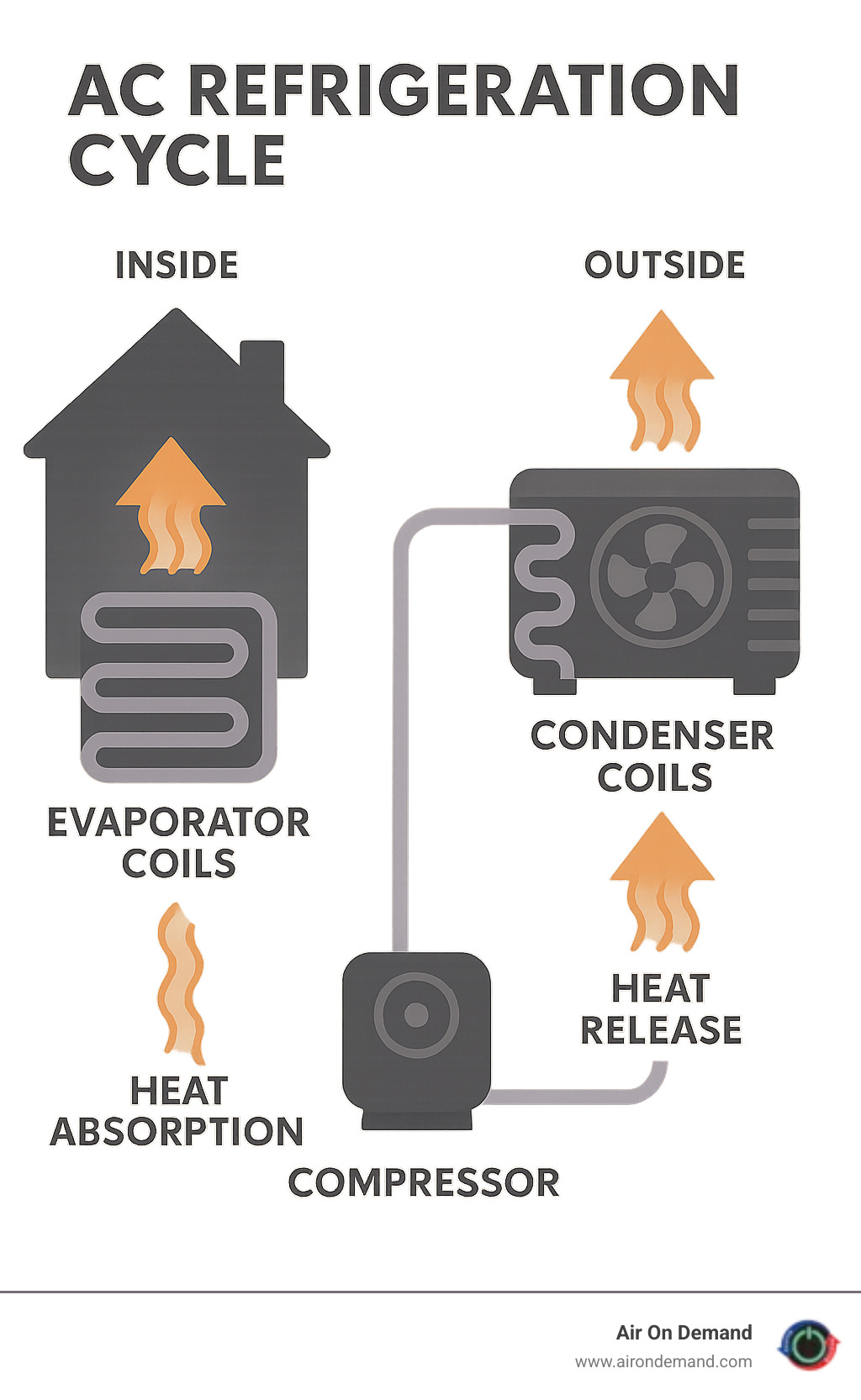
First Response: Simple DIY Checks Before You Call for Help
When you find your ac blowing hot air, your first instinct might be to immediately call for professional help. But here's some good news: many of the most common causes have surprisingly simple solutions that you can tackle yourself in just a few minutes.
Think of this as your AC detective work. We're going to walk through the most likely suspects behind that unwelcome warm air, starting with the easiest checks first. You might just save yourself a service call and get back to cool comfort faster than you'd expect.
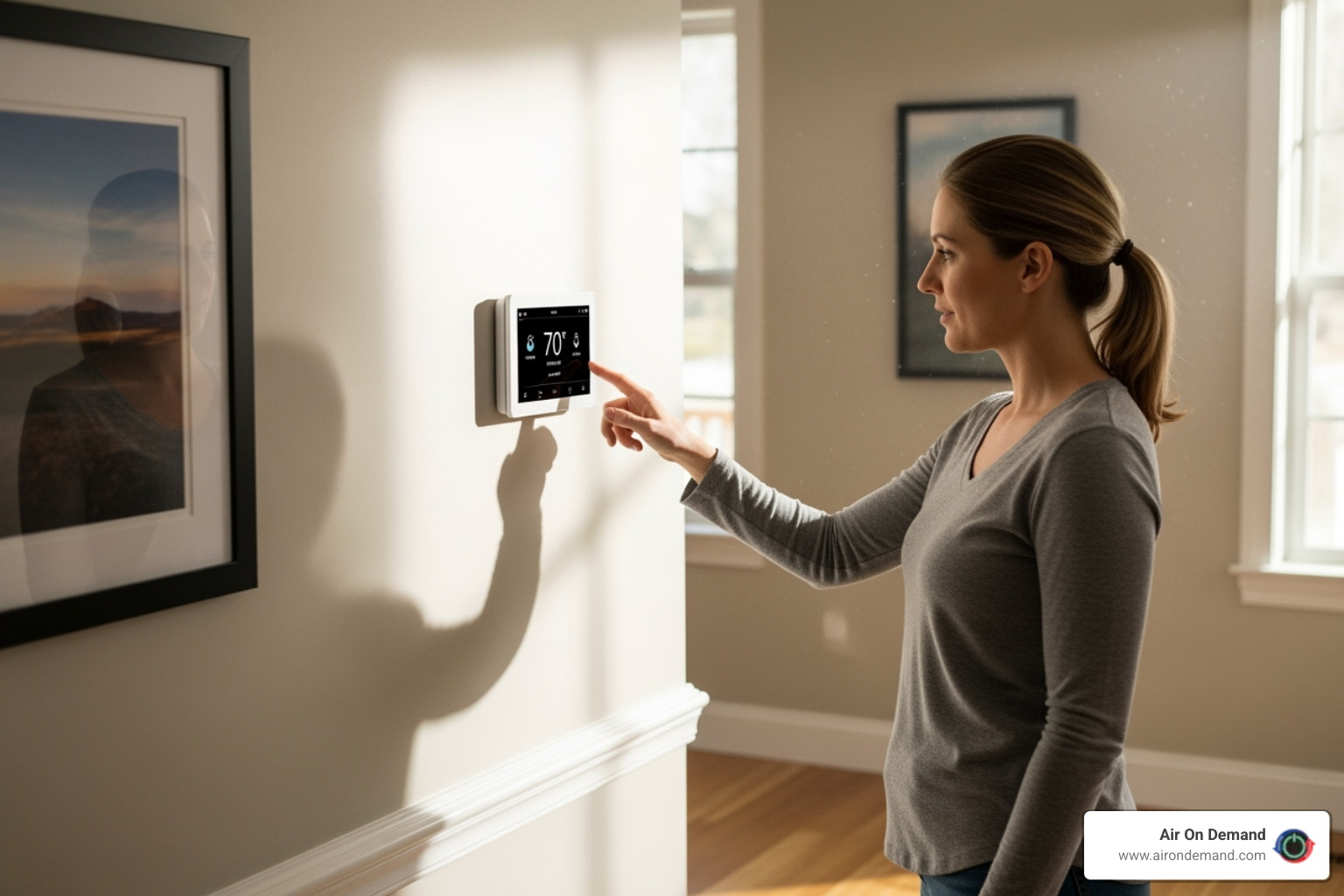
DIY Fixes for an AC Blowing Hot Air
Let's start with the basics. Sometimes the simplest explanation is exactly the right one, and a quick five-minute check can solve your problem completely.
Check Your Thermostat Settings First
This might sound almost too obvious, but you'd be amazed how often we get calls where the thermostat was accidentally bumped to the wrong setting. If your thermostat is set to "Heat" mode, well, your system is just doing what you asked it to do - heating your home instead of cooling it.
Even trickier is when the thermostat gets switched to "Fan Only" mode. In this setting, your indoor fan keeps running and circulating air, but the actual cooling system never kicks in. You'll feel air coming from the vents, but it won't be cool.
Take a moment to double-check that your thermostat is set to "Cool" and that the target temperature is actually lower than your current room temperature. Also make sure the fan setting is on "Auto" rather than "On" - this lets your system cycle properly instead of running the fan constantly.
Replace That Clogged Air Filter
Here's the number one culprit behind an ac blowing hot air: a dirty, clogged air filter. Your air filter is like the lungs of your AC system, and when it can't breathe properly, everything goes wrong.
When your filter gets packed with dust, pet hair, and debris, it chokes off the airflow across your evaporator coils. Less airflow means less heat gets absorbed from your home's air. In severe cases, the restricted airflow can actually cause your evaporator coils to freeze into a solid block of ice.
The fix is beautifully simple: replace your air filter. Most homes need a fresh filter every one to three months, but check yours monthly. If you have pets or anyone with allergies, you might need to change it more often. A clean filter can instantly restore your AC's cooling power.
Reset Your Circuit Breaker
Your outdoor AC unit draws a lot of electricity, and sometimes a power surge or electrical hiccup can trip its dedicated circuit breaker. When this happens, your outdoor unit shuts down completely, but your indoor fan might keep running - pushing uncooled air through your home.
Head to your electrical panel and look for the breaker labeled for your AC unit (it might say "AC," "HVAC," or "Air Conditioning"). If it's flipped to the middle position or "Off," that's your problem. Turn it fully off, wait about a minute, then flip it back on. If it immediately trips again, that signals a more serious electrical issue that needs professional attention.
Clear Those Blocked Return Vents
Your AC system needs to pull warm air back into the system just as much as it needs to push cool air out. Those large return vents in your home - usually covered by bigger grilles - can get blocked by furniture, curtains, or even curious pets.
Walk around your home and make sure all return vents are completely clear. Move any furniture or decorations that might be blocking airflow. Good circulation is essential for your system to work properly.
Power and Airflow Issues You Can Spot
Now let's venture outside and check on some issues that might not be as obvious but are still within your detective skills.
Check Your Outdoor Unit's Power
Sometimes the problem isn't with your indoor thermostat or filter - it's that your outdoor unit has lost power entirely. While your indoor fan keeps running (making you think everything's working), the outdoor unit that actually removes heat from your home has gone silent.
Look for a small electrical box mounted on the wall near your outdoor unit - this is the disconnect switch. Make sure it's flipped to the "On" position. If both this switch and your circuit breaker are on, but your outdoor unit still isn't running, you've likely found an issue that needs professional help.
Clean Your Outdoor Condenser Coils
Your outdoor unit works hard to release all the heat it pulls from your home, but it can't do its job when the condenser coils get caked with dirt, grass clippings, and debris. This buildup acts like a thick blanket, trapping heat instead of releasing it.
First, turn off power to your outdoor unit at the disconnect switch for safety. Then gently clear away any leaves, branches, or grass around the unit. You can carefully brush dirt off the coil fins or spray them lightly with a garden hose - spray from the inside out if you can reach it. Be gentle with those delicate fins.
Check for Drain Line Clogs
As your AC cools your home, it also removes humidity, creating water that needs to drain away. When the condensate drain line gets clogged with algae or debris, water backs up and triggers a safety switch that shuts down your cooling system.
Look for the condensate drain pan near your indoor unit. If it's full of standing water, you've likely found your problem. You can try pouring a mixture of equal parts white vinegar and water down the drain line access port, wait 30 minutes, then flush with plain water. For stubborn clogs, it's better to call in professional help rather than risk damaging your system.
The beauty of these DIY checks is that they're all safe, simple, and can often get your AC back to blowing cool air within minutes. But if you've worked through this list and you're still getting warm air from your vents, it's time to call in the experts - that's where more complex issues like refrigerant leaks or compressor problems come into play.
Why Your Home AC is Blowing Hot Air: Common Culprits
When your simple DIY checks don't solve the problem, your ac blowing hot air is likely telling you something more serious is happening behind the scenes. These deeper issues usually involve the core components that make your AC system tick - and they're definitely not the kind of problems you want to tackle yourself on a weekend afternoon.
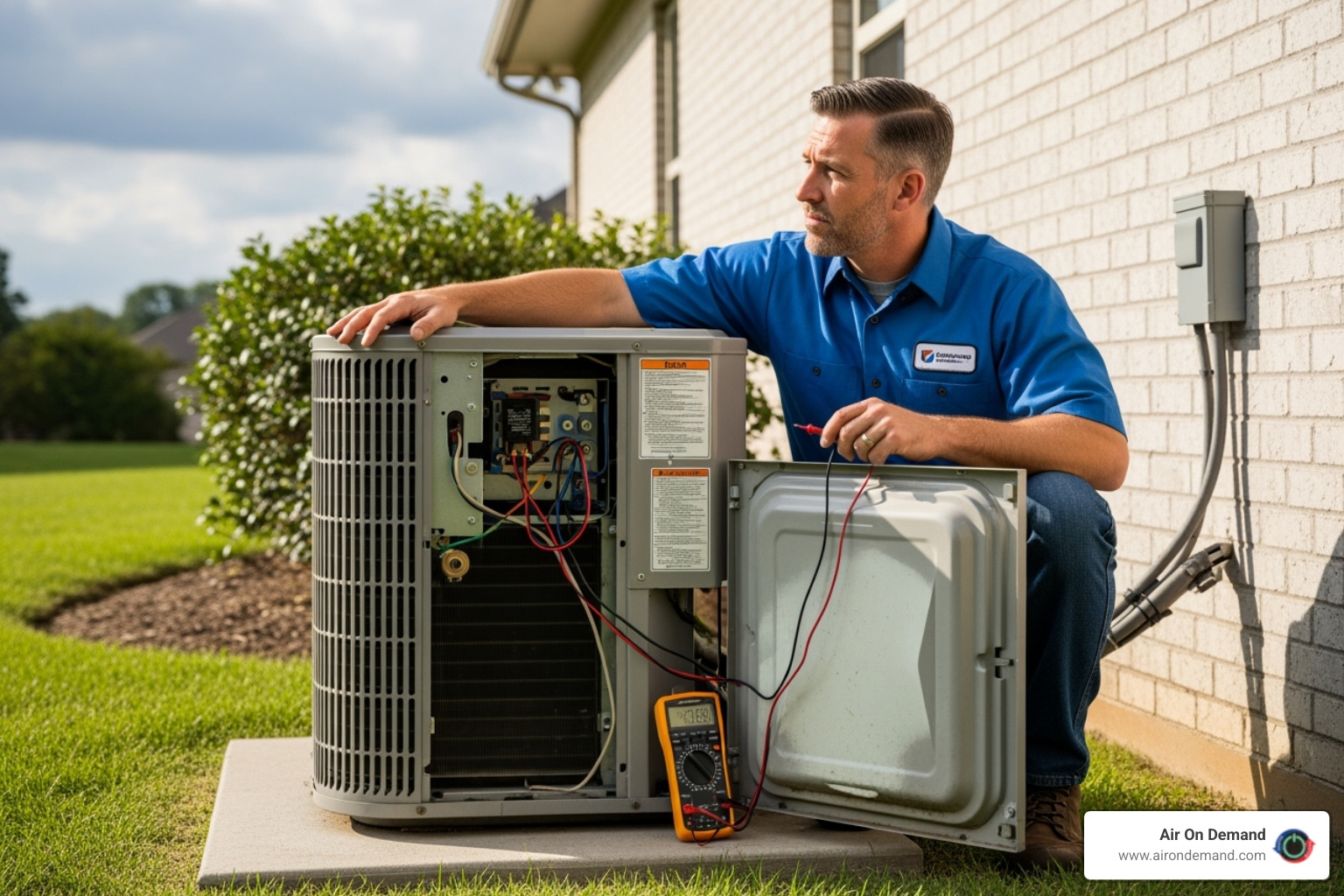
Think of these issues like engine problems in your car - you might know something's wrong when you hear that weird noise, but you're probably not going to pop the hood and start rebuilding the transmission. These AC problems need the right tools, proper training, and sometimes a little refrigerant wizardry that only comes with experience.
The good news is that most of these repairs fall into a manageable range. Simple fixes might cost you less than a nice dinner out, while major component failures can run higher - but knowing what you're dealing with helps you make smart decisions about repair versus replacement.
Refrigerant and Coil Problems
Your AC's refrigerant is like the blood in your veins - it needs to flow properly and stay at the right levels for everything to work. When something goes wrong with the refrigerant or the coils it travels through, your cooling system basically throws in the towel.
Low refrigerant levels are probably the most misunderstood AC problem out there. Here's the thing - your AC doesn't "use up" refrigerant like your car burns gas. It's a closed system, which means if your refrigerant is low, you've got a leak somewhere.
When refrigerant levels drop, your system simply can't absorb enough heat from your home's air. You might notice a hissing or bubbling sound coming from your unit, or see ice building up on the refrigerant lines even when your filter is clean. Your energy bills might creep up too, as your system works harder and harder to cool your home.
This isn't a DIY situation. Refrigerant requires special handling and proper disposal - it's not something you want to mess with. Our certified technicians can track down leaks, seal them up properly, and recharge your system to the right levels.
Frozen evaporator coils can happen for several reasons, but they all lead to the same frustrating result. When those coils turn into ice blocks, they can't absorb heat from your air anymore. Your fan keeps blowing, but the air just passes over the ice without getting cooled.
If you find frozen coils, turn off your AC immediately and switch the fan to "On" to help melt the ice. While you're waiting, double-check your air filter and make sure all your return vents are clear. But if those coils freeze up again after thawing, you're probably looking at a refrigerant leak or another underlying issue that needs professional attention.
Dirty condenser coils outside your home work overtime during hot weather. When they get caked with dirt, grass clippings, and debris, they can't release heat effectively. It's like trying to cool down while wearing a heavy winter coat - everything just works harder with less success.
While you can try cleaning these coils yourself, sometimes they need the deep-clean treatment that comes with professional tools and solutions. Regular maintenance keeps these coils working efficiently, so your system doesn't have to struggle through another summer.
Major Mechanical and System Failures
These are the big-ticket items - the problems that make you pause and consider whether repair or replacement makes more sense. They're almost always beyond DIY territory, but understanding them helps you make informed decisions.
A malfunctioning compressor is like having a heart attack - everything else might be fine, but without that central pump working, nothing happens. The compressor moves refrigerant through your system, and when it fails, your cooling stops completely.
You might hear loud grinding, rattling, or buzzing noises from your outdoor unit, or notice that it's not turning on at all even though your indoor fan keeps running. Sometimes a failing compressor will keep tripping your circuit breaker as it struggles to start.
Compressor problems are serious business. Depending on your system's age and overall condition, it might make more sense to replace the whole unit rather than invest in a major compressor repair.
Leaky ductwork is the sneaky thief of cool air. Your ducts are supposed to deliver that precious cooled air throughout your home, but if they have holes, loose connections, or poor sealing, a lot of that air escapes into places you don't want it - like your attic or crawl spaces.
Even worse, those same leaks can suck warm, unconditioned air into your ducts, mixing it with your cooled air and making everything feel warmer than it should. Professional duct inspection and sealing ensures your conditioned air actually makes it to where you need it most.
Blower motor issues create their own special kind of frustration. The blower motor pushes your cooled air through the ducts and out your vents. When it's struggling or failing, you might get weak airflow or no air movement at all, making it feel like your ac blowing hot air even when the cooling components are working fine.
Electrical problems can be the trickiest to diagnose because they're often invisible until something stops working. Beyond simple circuit breaker trips, you might be dealing with faulty wiring, a bad capacitor that helps start your motors, or issues with the contactor that sends power to your compressor.
These electrical gremlins can cause components to run intermittently, fail to start, or shut down unexpectedly. Since we're talking about high-voltage electrical components, these repairs should always be left to trained professionals who know how to work safely with your system.
Frequently Asked Questions about Warm Air from Vents
When you find your ac blowing hot air, it's natural to feel a mix of frustration and worry. We've been helping homeowners through these exact situations for years, and the same questions come up time and again. Let's address the most common concerns with straight answers that can help you make the best decisions for your home and family.
Should I turn off my AC if it's blowing warm air?
Yes, turn it off right away! This is one of the most important things you can do when you notice warm air coming from your vents. We know it feels counterintuitive - your home is getting warmer, and your first instinct might be to keep the system running, hoping it'll start cooling again. But trust us on this one.
Continuing to run a malfunctioning AC can prevent further damage to expensive components. Think of it like driving a car with the engine overheating - you wouldn't keep pushing the gas pedal, right? The same logic applies here. If your system has a refrigerant leak or the compressor is struggling, running it longer can turn a manageable repair into a major replacement.
Your compressor works especially hard when something's wrong, and compressor strain can lead to complete failure. Since the compressor is one of the most expensive parts to replace, protecting it by shutting down the system is a smart financial move.
You'll also save energy by turning it off. An AC that's blowing warm air is still drawing power - sometimes even more than usual as it struggles to cool your home. Why pay for electricity that's not giving you any comfort?
Finally, there's the safety factor. Some issues, particularly electrical problems, can create hazards. Shutting down the system eliminates these immediate risks while you figure out what's going on.
Once you've turned off your AC, you can work through those DIY troubleshooting steps we covered earlier, or give us a call if you suspect something more serious.
How much does it cost to fix an AC blowing hot air?
This is probably the question we hear most often, and honestly, it's like asking "how much does it cost to fix a car?" The answer depends entirely on what's actually wrong with your system.
Simple fixes often cost very little. If it's just a dirty air filter, you're looking at the price of a new filter and maybe fifteen minutes of your time. Thermostat setting issues or a tripped circuit breaker? Those might not cost you anything beyond a service call if you need our help identifying the problem.
Moderate repairs fall somewhere in the middle. Things like cleaning severely dirty coils, clearing stubborn drain line clogs, or replacing small electrical components like capacitors typically represent reasonable investments in your system's health.
Major repairs are where costs can add up quickly. Refrigerant leaks require special equipment to detect and repair, plus the cost of recharging the system. Compressor problems, blower motor failures, or extensive ductwork issues represent the higher end of repair costs.
Here's what we always tell our customers: age matters. If your system is relatively new and well-maintained, most repairs make financial sense. But if you're dealing with an older unit that's had multiple issues, we'll have an honest conversation about whether repair or replacement gives you better long-term value.
We believe in transparent pricing, so we'll always provide a clear estimate after diagnosing the issue. No surprises, no pressure - just honest advice about your best options.
How often should I change my home's air filter?
The general rule is every one to three months, but your specific situation might call for something different. We've seen filters that looked brand new after three months, and others that were completely clogged after just a few weeks.
Homes with pets need more frequent changes. Dog and cat hair, along with dander, can clog a filter surprisingly fast. If you've got furry family members, check that filter monthly and be prepared to change it every month or two.
High-use periods also matter. During our hot summers, your AC runs almost constantly, which means it's pulling more air through that filter. The more air that passes through, the more particles get trapped.
Allergy considerations can't be ignored either. If someone in your household deals with allergies or asthma, a clean filter isn't just about AC efficiency - it's about breathing easier. Monthly changes often make sense in these situations.
Don't forget to check your manufacturer recommendations too. Some systems have specific requirements based on the type of filter they use or the design of the air handler.
The truth is, checking your filter monthly takes about thirty seconds and can prevent your ac blowing hot air due to restricted airflow. It's one of the simplest ways to keep your system running smoothly and your energy bills reasonable.
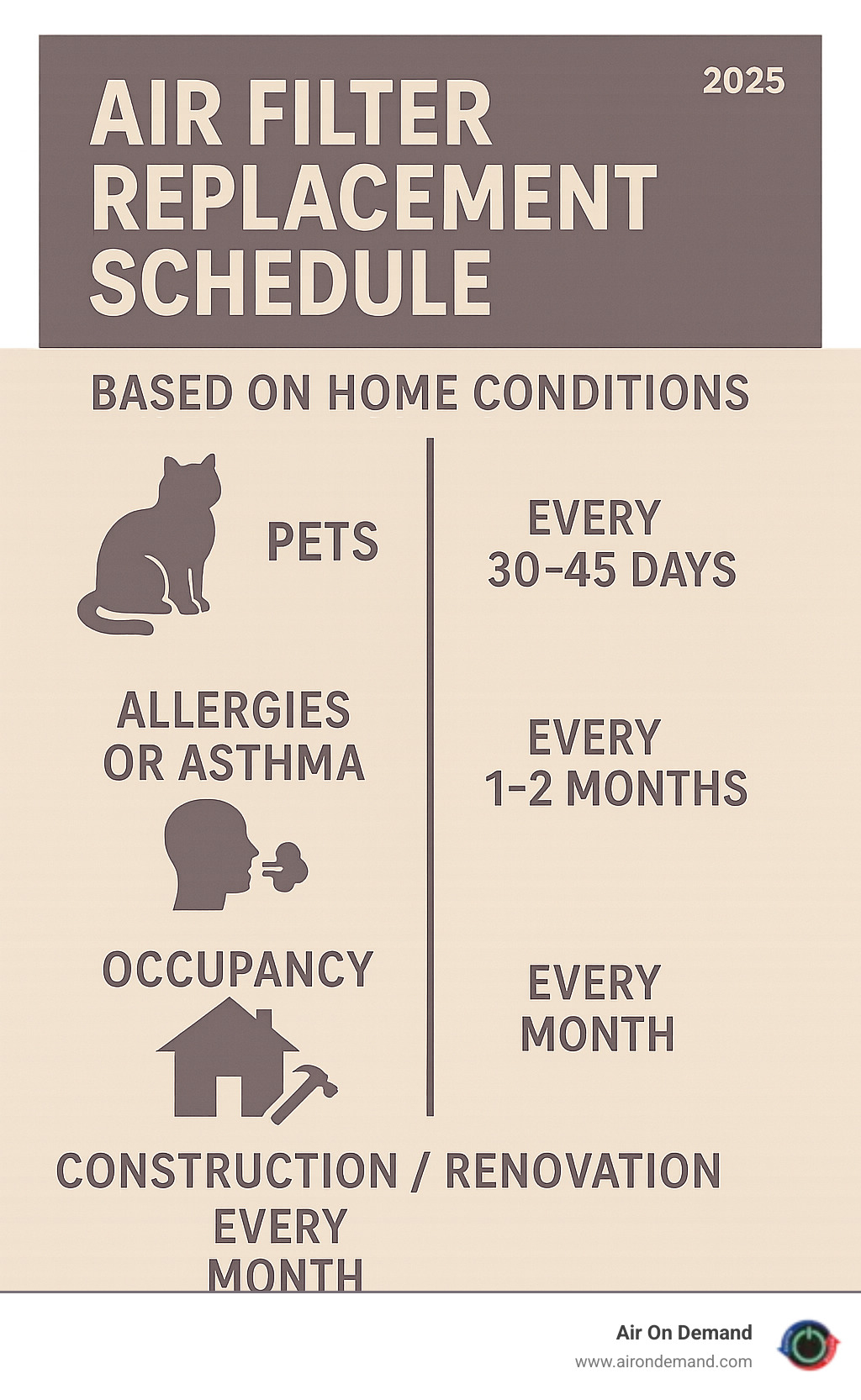
Stay Cool: Preventing Future Issues and When to Get Expert Help
Nobody wants to deal with an ac blowing hot air crisis twice. The good news? With some smart prevention strategies and knowing when to call in the pros, you can keep your home comfortably cool all season long.
Think of your AC system like your car - regular maintenance keeps it running smoothly and helps you avoid those dreaded breakdowns at the worst possible moments. Annual tune-ups are your best defense against future cooling catastrophes. We recommend scheduling yours in spring, before the summer heat really kicks in.
During a professional maintenance visit, our technicians become detectives for your AC system. They'll clean both your indoor and outdoor coils to ensure maximum heat transfer, check refrigerant levels and hunt for any sneaky leaks, and inspect all electrical connections for wear or corrosion. They'll also lubricate moving parts to reduce friction and wear, clear your condensate drain line to prevent water backups, and verify your thermostat is reading temperatures accurately.
This proactive approach catches small hiccups before they turn into major headaches. Plus, a well-maintained AC system runs more efficiently, which means lower energy bills and a longer system lifespan. It's like giving your AC a health checkup that pays for itself.
At Air On Demand, we've built our reputation on making HVAC solutions as seamless as possible. Our specialty in high-quality Daikin products means you're getting reliability and efficiency that's built to last. What sets us apart is our commitment to your convenience - online booking that fits your schedule, fast service when you need it most, and real-time updates so you always know what's happening with your repair.
When you choose Daikin products through us, you're also getting peace of mind with strong warranties like the 12-year parts warranty and our Comfort Promise. We stand behind our work because we believe you deserve nothing less than total comfort in your home.
While we love empowering homeowners with DIY knowledge, we also know when it's time to step aside and let the experts take over. If you've worked through our troubleshooting steps and your ac blowing hot air problem persists, or if you suspect issues like refrigerant leaks, compressor problems, or complex electrical faults, that's your cue to call us.
Our expert technicians have the specialized tools and training to diagnose tricky problems quickly and fix them right the first time. Don't let a malfunctioning AC turn your home into a sauna - we're here to restore your cool comfort fast.
Schedule your professional AC repair in Miami and let our team get your home back to the perfect temperature where it belongs.

